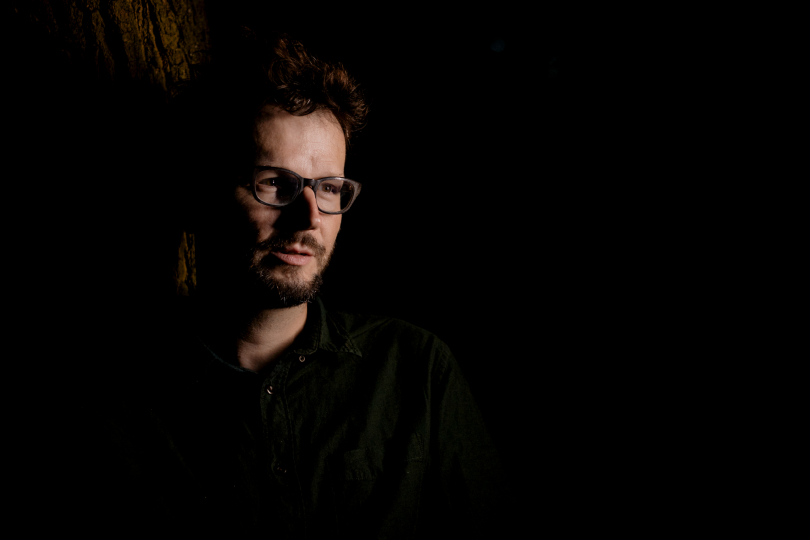
Floex: I believe in my own path and style
A few years ago, Tomáš Dvořák explained to me why he signs his game soundtracks with his personal name. According to him, it has always represented a slightly different entity than Floex's work. But since then, the two different approaches have started to merge into one universe, also because of streaming platforms. This has its pros and cons. Last year, Dvořák released the soundtrack for the video game Papetura and, together with Tom Hodge, he also provided the music for the German film Je suis Karl. How does this sought-after Czech producer and composer approach his diverse creative endeavours?
At various stages of your career, you signed your soundtracks as Tomáš Dvořák, and at other times as Floex. Do you feel that these are two identities that have gradually grown into one?
That's a complicated question that must seem a bit confusing to an outside observer. I think I'll be separating the two until the end of my career. I had a period when I strictly kept them apart because I felt that my original work was quite different from my soundtracks. Later on, I tried to merge everything under Floex, because sometimes people didn't know both names or didn't understand that it was a different project by a similar artist. But I actually kind of regret that today.
Why do you regret it?
Floex is more tightly locked into deeper music. And soundtracks sometimes get very playful or childish. But nowadays, I deal with it mostly because of Spotify and the ordering of songs by popularity, a feature that can't be changed. At the top, there is still hanging one song from the Samorost 3 soundtrack, which I'd describe as a country music bedtime story thing. It may seem trivial, but Spotify in particular has a huge influence here.
Have you ever experienced the influence of digital algorithms at concerts?
Sure, for example, we've been promoted at international festivals with a slightly wacky game soundtrack. Especially abroad, my music is often presented through them. Unfortunately, this can't be controlled—in the streaming environment, it's hard to choose a selection of songs that the artist feels best defines their work.
So what solution did you eventually arrive at?
Last year, I decided to publish things that somehow stand out under my stage name. Those that fall into that category, I'll keep under the pseudonym Floex. So I kind of returned to the beginning.
Apart from your solo work, what projects with international overlap have you been involved in recently?
The most important area is definitely computer game soundtracks. The main one is, of course, the long-term cooperation with the Czech studio Amanita Design. Together we have created a number of titles. Thanks to these projects, I have established myself on the international scene of composers in this field.
Has this cooperation opened many doors for you?
The proof is that other foreign studios, whether independent or mainstream, are also contacting me. I'm quite picky about this, though, because Amanita has set the bar really high for me.
Which studios impressed you enough to connect with them?
Besides Amanita Design, I've been working on a new game with Polish developer Thomasz Ostafin called Papetura, which was released last May. However, I also communicated with the world's biggest studios. I had meetings with Sony and Microsoft, for example. Unfortunately, we never got past the negotiation phase and the production of the demo recording.
Do you also create music for any brands or commercial entities?
Not really. Fortunately, I rarely do music for commercials now. Honestly, I don't think I am strong at that. I believe in my own path and style, through which I am approached by partners who want to collaborate on more original projects.
So game and film soundtracks are the main part of your creative work that you make your living with?
Yes, I'm happy like that. I'm very lucky that the projects I work on are profitable, but they're still primarily beautiful and a pleasure to work on. I don't feel any pressures in my artistic work, except perhaps the fact that one has to carefully distribute one's energy between collaborating on projects and creating.
Now that you mention it, just out of curiosity, what are the royalties for international video game music?
It's really very diverse. Interestingly, there's a similar difference in that area as there is in artistic music. For indie developers, there's a chance to negotiate a cut of sales. It's risky, but it's also a fair deal that can pay off in the end if the game is successful. That can't happen with mainstream studios. They always pay a lump sum and thus buy the exclusive license and all rights to your music.
What do you consider the highlight of your composing career, aside from all the possible music awards and Floex achievements?
I have to name the collaboration with Amanita Design again. They are truly unique and a worldwide phenomenon. Every project with them represents a lot of joy and inspiration for me.
What synths or plugins have inspired you the most as a producer lately?
What synths or plugins have inspired you the most as a producer lately?
I'm playing a lot with Digiton at the moment, it's a digital synth, but very inspiring. It has a very diverse potential. It's very organic, intuitive, and I'm really enjoying the possibilities of targeting modulations and other variable aspects of the sound. It also blends well with other effects. A total revolution in the studio was the McDsp APB-8 box. It's an eight-track analogue compressor and summing mixer, but it can be fully controlled and automated through a software interface. That eliminates the endless problem of how to save the settings at the HW. Above all, I haven’t found a software with similar sound yet.
If you have found an error or typo in the article, please let us know by e-mail info@insounder.org.
